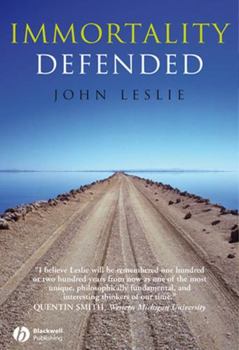Immortality Defended
Select Format
Select Condition 
Book Overview
Might we be parts of a divine mind? Could anything like an afterlife make sense? Starting with a Platonic answer to why the world exists, Immortality Defended suggests we could well be immortal in all of three separate ways.
Tackles the fundamental questions posed by our very existence, among them, "why does the cosmos exist?", "is there a divine mind or God?", and "in what sense might we have afterlives?"
Defends a belief...
Format:Paperback
Language:English
ISBN:140516204X
ISBN13:9781405162043
Release Date:April 2007
Publisher:Wiley-Blackwell
Length:112 Pages
Weight:0.05 lbs.
Dimensions:0.3" x 6.5" x 8.5"
Customer Reviews
1 rating
Immortality via Pantheism
Published by Thriftbooks.com User , 14 years ago
This is an admirably brief book of philosophy which outlines and defends a model of pantheism. The discussion of immortality is actually only a small part of the story, and Leslie's ideas about that topic follow fairly naturally once the pantheistic stage is set. It's an interesting approach to trying to understand reality in a manner distinct from both traditional theism and naturalism. Leslie's model has several contentious elements. First, he argues that some form of Platonism is true: he says that even if the cosmos did not exist, it would exist as an abstract possibility, and he is likewise a realist about things like mathematical truths, and, importantly, ethical truths. The next key concept, which he finds first in Plato, is the notion that "the Good" calls forth the existence of the concrete world. Finally, he adopts from Spinoza the suggestion that what exists can also be described as aspects of a divine mind. The most difficult idea is that of the Good as a creative principle: the world exists because it is ethically required that it should. He argues for this indirectly: he wants to convince the reader it's a coherent idea, and that the nature of the world is consistent with it (its intelligibility, orderliness and life-suitability). And while the world has a lot in it which isn't good at all, the pantheist just has to argue that our world is valuable enough to be one of potentially many worlds to manifest the creative principle. Put alternatively, our world is interesting enough to be something worthy of contemplation by a divine mind. With regard to this idea of being part of divine mind, Leslie thinks there is evidence for this in the kind of unity manifested in our own conscious minds, and likewise in the holistic aspect of nature generally, given quantum theory. Leslie discusses three models of immortality. First is the model of the universe as a four-dimensional block. If the past and future are as real as the present, then any person who ever lives has a type of immortality. But more interestingly, if we accept the idea of being part of a divine mind, then perhaps this mind could think thoughts about us beyond the lifespan we're in now: this would be the afterlife. Third, and more generally, because the divine mind is itself eternal, and our life-pattern is one aspect of its being, we might thus survive bodily death, in a fashion, by virtue of our participation in the future of the divine mind.





